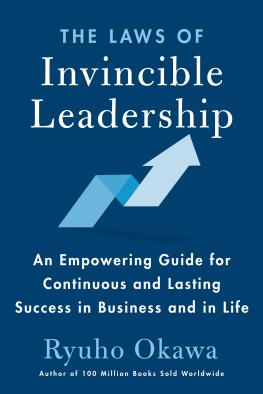
Table of Contents
Guide
Pages
Copyright 2018 by Hiroshi Mikitani. All rights reserved.
Published by John Wiley & Sons, Inc., Hoboken, New Jersey.
Published simultaneously in Canada.
No part of this publication may be reproduced, stored in a retrieval system, or transmitted in any form or by any means, electronic, mechanical, photocopying, recording, scanning, or otherwise, except as permitted under Section 107 or 108 of the 1976 United States Copyright Act, without either the prior written permission of the Publisher, or authorization through payment of the appropriate percopy fee to the Copyright Clearance Center, Inc., 222 Rosewood Drive, Danvers, MA 01923, (978) 7508400, fax (978) 6468600, or on the Web at www.copyright.com. Requests to the Publisher for permission should be addressed to the Permissions Department, John Wiley & Sons, Inc., 111 River Street, Hoboken, NJ 07030, (201) 7486011, fax (201) 7486008, or online at www.wiley.com/go/permissions.
Limit of Liability/Disclaimer of Warranty: While the publisher and author have used their best efforts in preparing this book, they make no representations or warranties with respect to the accuracy or completeness of the contents of this book and specifically disclaim any implied warranties of merchantability or fitness for a particular purpose. No warranty may be created or extended by sales representatives or written sales materials. The advice and strategies contained herein may not be suitable for your situation. You should consult with a professional where appropriate. Neither the publisher nor author shall be liable for any loss of profit or any other commercial damages, including but not limited to special, incidental, consequential, or other damages.
For general information on our other products and services or for technical support, please contact our Customer Care Department within the United States at (800) 7622974, outside the United States at (317) 5723993, or fax (317) 5724002.
Wiley publishes in a variety of print and electronic formats and by printondemand. Some material included with standard print versions of this book may not be included in ebooks or in printondemand. If this book refers to media such as a CD or DVD that is not included in the version you purchased, you may download this material at http://booksupport.wiley.com. For more information about Wiley products, visit www.wiley.com.
Library of Congress CataloginginPublication Data is Available:
ISBN 9781119412229 (Hardcover)
ISBN 9781119412212 (ePDF)
ISBN 9781119412250 (ePub)
Cover Image: Mika Ninagawa
Cover Design: Rakuten
This book is for my partner in life and work and our children.
Introduction
Dreams are for the young. This is a beautiful saying. But it's wrong. Dreams are the very fuel that moves our society forward.
Although there's nothing wrong with having dreams when you're young, the saying implies that you no longer have time to dream once you grow up and are thrown into the cold reality of society.
I would argue that dreams are even more valuable as you move through your life. But as you leave childhood behind, you must do more than dream. Just having a dream is meaningless. You must turn your dreams into specific goals, work out the steps necessary to achieve them, and then, one by one, actually take those steps. You have to use everything you haveyour talents, abilities, strength, and perseveranceto reach these goals.
You need skills to realize your dreams. What's more, you need a system and a process to acquire those skills and execute them. This is what in Japanese we call creating shikumior systemization. When you pair a dream with a shikumi, you may reach even the most extraordinary goals.
I had a dream over two decades ago, and I have spent my whole life since pursuing that dream. The number of people who have joined me in pursuing the same dream has also grown. The company I started with one other person has grown into a company of thousands. And the whole time, I've been constantly asking myself: How can I best communicate my method of achieving dreams and goals? What do you have to do to be truly successful? And what shouldn't you do?
I've put my ideas into words and shared them with my colleagues many times, and I believe Rakuten is what it is today as a result of this effort. The company's continued growth, even through times of global economic crisis, is proof of that.
I share my methods more widely now because we are in an era of great changea turbulent time when dreams and their execution could not be more important.
We are at a time when it's clear that the internet is not simply a new formatanother channel for our existing products and services. Instead, it is a platform on which transformed industries will grow and change. The internet has already reconfigured commerce and the media. It's now far into its transformation of financial services, turning money from bills and coins into a digitized promise and giving rise to a new industry (fintech). It's clear that this is only the start of change that will move through all industries. What will the next new major industry transformations be? Autotech? Pharmatech? Edutech? And as those industries rise up, what new questions will they raise? As the internet becomes the platform for education, of course we rethink the nature of books but we can also ask: What is a teacher? What is a classroom? What is a student? How does the internet transform these basic concepts? This is true for every industry. We are also seeing the changes take place in transportation. Already we have AI drones and cars. What is next? Even my own job will face change. Will we see the AI CEO? That's not so farfetched.
In a time of great change, it becomes that much more important to have guiding principles. These are not rules that cut us off from change, but truths that help us navigate it. They are methods that help us move forward and achieve our dreams. They are principles that give us a system in which to operate effectively.
This book, BusinessD, is a detailed look at my guiding principles, offering specific instructions, stories, and techniques to help anyone realize dreams and achieve lasting success. In Japanese characters, D represents the way or the path and it can be used to represent an essential philosophy, spirit or a moral code. You might be more familiar with the term Bushido which also uses this character and is loosely translated as the way of the warrior. This book breaks down my fundamental philosophy for business and leadership into useful lessons. You can be successful in business as well if you put these lessons into practice. They reflect how I think and act when facing the problems that arise in business. You don't have to learn all the rules. If you follow the ones that speak to you, I'm sure the doors of opportunity will open to you.
Don't be troubled by critics who say dreams and reality are two different things. That's just a spiteful excuse used by those who didn't work hard enough to realize their dreams. Of course dreams and reality are different. But that's why turning dreams into reality is so worthwhile and rewardingnot just for the dreamer, but for all of us who benefit when big dreams become successful reality.
It is my hope that this book helps you realize your dreams.
Here's how it's done.
Hiroshi Mickey Mikitani
Clean Your Space
 Next page
Next page










